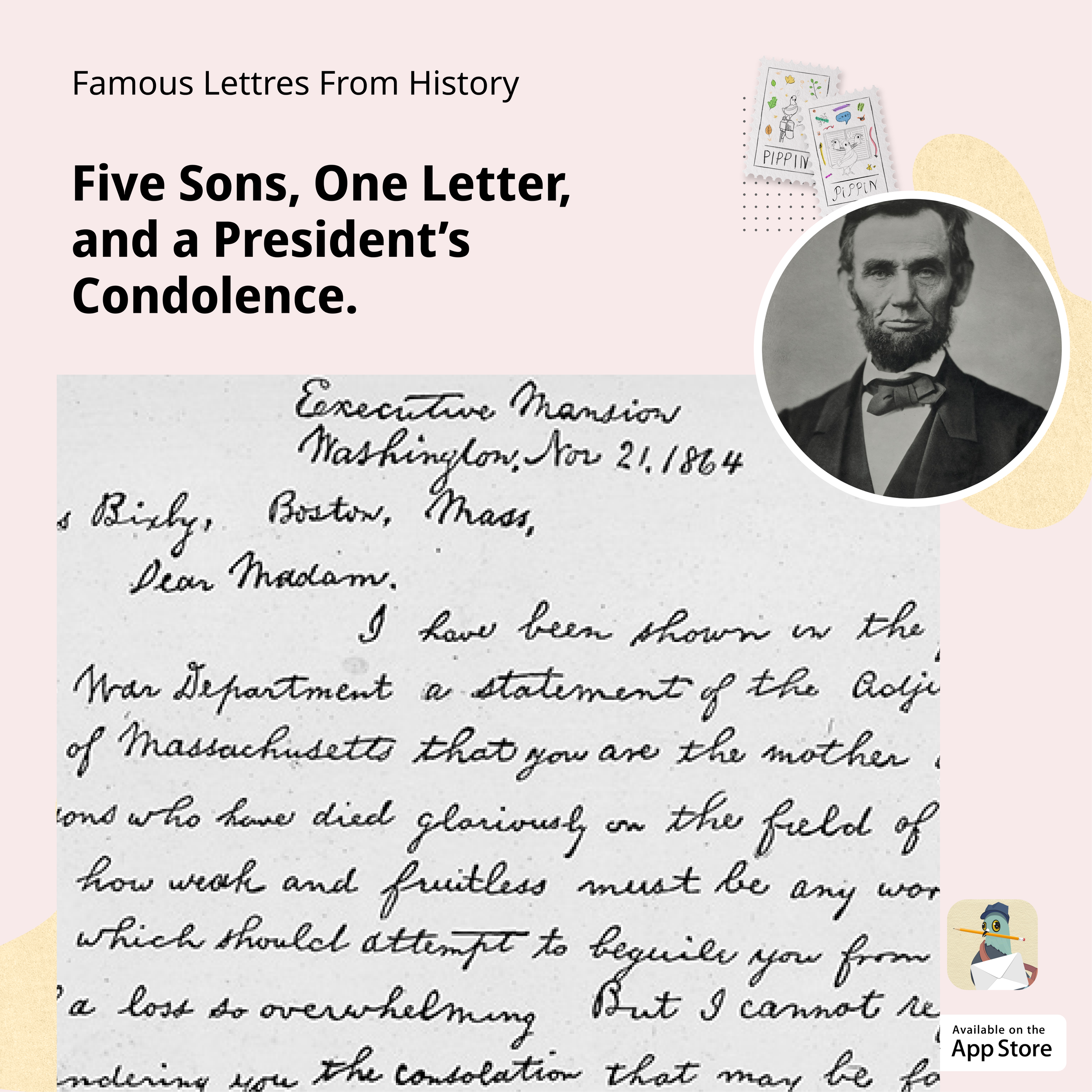Five Sons, One Letter and a President’s Condolence.
Some letters are meant to share news, others to inspire, and a few… to comfort wounds that can never truly heal. In the fall of 1864, with the American Civil War nearing its bloody conclusion, President Abraham Lincoln sent one such letter to Mrs. Lydia Bixby, a widow from Massachusetts who was believed to have lost five sons in the conflict.
The result was a brief but powerful piece of writing that has since become one of the most famous condolence letters in history: a model of presidential empathy and human compassion.
🕰 The Moment in Time
By late 1864, the Civil War had claimed hundreds of thousands of lives. Families across the nation were grieving but Mrs. Bixby’s loss was reported as uniquely devastating. The Adjutant General of Massachusetts informed Lincoln that she had given five sons to the war, each “dying gloriously on the field of battle.”
Moved by the enormity of her sacrifice, Lincoln or possibly his private secretary, John Hay crafted a letter that combined deep sorrow with a solemn recognition of service.
The Letter Itself
The lettre from President Abraham Lincoln to Mrs. Lydia Bixby
[full transcript]
“
Executive Mansion, Washington, November 21, 1864
Dear Madam,
I have been shown in the files of the War Department a statement of the Adjutant General of Massachusetts that you are the mother of five sons who have died gloriously on the field of battle.
I feel how weak and fruitless must be any word of mine which should attempt to beguile you from the grief of a loss so overwhelming. But I cannot refrain from tendering to you the consolation that may be found in the thanks of the Republic they died to save.
I pray that our Heavenly Father may assuage the anguish of your bereavement, and leave you only the cherished memory of the loved and lost, and the solemn pride that must be yours to have laid so costly a sacrifice upon the altar of freedom.
Yours, very sincerely and respectfully,
A. Lincoln (signed)
“
Layers of Truth & Myth
While the letter’s sentiment is unquestionable, historians have uncovered some complexities:
The Loss Count – Records suggest only two of Mrs. Bixby’s sons were actually killed in battle. One deserted, one was honorably discharged and one’s fate is uncertain. The report that reached Lincoln was likely the result of miscommunication or exaggeration.
The Authorship Debate – Linguistic analysis in recent years points strongly to John Hay, Lincoln’s secretary, as the likely author, though many still attribute the prose to Lincoln himself. The choice of certain words, the style of phrasing and similarities to Hay’s private letters fuel this theory.
The Letter’s Fate – The original letter has never been found. Mrs. Bixby was said to be a Southern sympathizer and may not have treasured it. Some accounts suggest she destroyed it, others that she gave it away. What survives are printed transcriptions and copies made for newspapers.
Legacy & Cultural Resonance
Even with its disputed details, the “Bixby Letter” remains one of the most quoted letters in American history:
In Film – It plays a pivotal role in Saving Private Ryan, where General Marshall reads it to inspire the rescue of a sole surviving son.
In Politics – Presidents and public figures have recited it at memorial services, including after 9/11.
In Memorials – The words “so costly a sacrifice upon the altar of freedom” appear on plaques and monuments across the U.S.
Its lasting power lies in the fact that it addresses grief without attempting to erase it: acknowledging pain while honoring the cause for which the loss occurred.
Why Lettre Shares This
At Lettre, we believe the worth of a letter lies not only in its historical significance, but in its emotional truth. Lincoln’s letter, whether penned by him or his secretary has survived as a testament to the ability of written words to bridge unimaginable distances: between government and citizen, between grief and gratitude, between history and the present moment.
We share it because it encapsulates the mission of Lettre: to preserve and pass forward letters that speak to the heart, so their voices never fall silent.
Final Reflection
The Bixby Letter stands as a reminder that in our most difficult hours, words still matter. They cannot undo loss, but they can offer solace, recognition, and the assurance that a sacrifice is seen and remembered.
It is more than a letter, it is a fragment of national memory, echoing across time, urging us to value the bonds of love, duty, and empathy.



